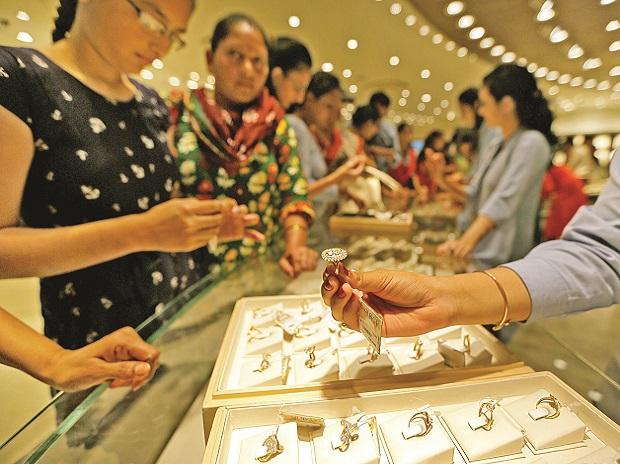RJ Market Watch
Jewellers bargain on rent, pare store sizes and stocks to stay afloat

The Rs 475,000-crore Indian jewellery sector has entered a consolidation phase with jewellers renegotiating for a 25-30 per cent of cut in rent, reducing store sizes and inventories, and pruning other fixed costs including labour and technology for survival.
This situation has been fuelled by the rally in the price of gold, with bullion hitting new highs everyday on global cues. Jewellery buyers have deferred new purchase amid expectations of a correction in gold prices. Apart from the prohibitive price of the metal, the general apathy of consumers who are avoiding store visits and are only buying gold coins or picking up small quantities of ornaments for weddings, has also dampened end-user sentiment. Large-scale wedding purchases and festivals demand are not seen now.
Normally, jewellers see a sharp increase in scrap jewellery sales in June and July, as farmers mortgage their ornaments to buy seeds and fertilisers for kharif crop sowing. But this time the intermittent and scattered lockdown has hit scrap jewellery sales.
“Customers are not coming to stores because of high gold prices and coronavirus fears. Hence, sales are going down day by day forcing jewellers to tighten their belts and cut expenditure. They are closing down non-performing stores, reducing the size of even performing stores, re-negotiating rentals with 25-30 per cent cuts in monthly outgo and deferring fresh investments on designs and marketing for survival,” said Anantha Padmanabhan, managing director NAC Jewellers, a Chennai-based jewellery chains and chairman, All India Gems and Jewellery Domestic Council (GJC).
Rajesh Mehta, Chairman, Rajesh Exports, said, “Many jewellers would find survival difficult in the current circumstances and would adopt various strategies, including cutting down on rentals and reducing store sizes.”
Many jewellers have decided to cut their store size by 50 per cent at strategic locations and reduce number of points of sale (POS).
Jewellers in India have been struggling for survival ever since the government announced demonetisation of high value currency notes i.e. Rs 500 and Rs 1,000 notes on November 8, 2016.
The move took 86 per cent of the liquidity out of the system and evaporated cash transactions.
The jewellery business started gradually improving even with high gold prices. But, the coronavirus (Covid-19) pandemic spread in February this year hit the entire world hard. The price of gold has jumped by around 70 per cent since January 1, 2019.
“With diminishing sales making survival difficult, it is the right time for jewellers to revisit their strategies and work out all possible options. Single-store jewellers do not have any problems as their businesses are small. But, those who have grown bigger with three or more stores, would certainly face problems due to the lack of income and sustained fixed costs which steadily eat away their capital and worsen the balance sheet,” said Padmanabhan.
Meanwhile, jewellers are now urging migrant workers to stay in their hometowns till the overall situation improves. Earlier, they had wanted the workers back in July and August to start jewellery making for Dushera and Diwali, for which jewellers normally keep ornaments ready about a month in advance.
“Those who built their inventories by raising working capital from banks have started melting jewellery in stock to pay interest in time. Now, jewellers are working on strategies to pre-pay loans to remain debt-free. Also, workers have been asked to stay back in their hometowns to avoid the additional burden of salary,” said Surendra Mehta, National Secretary, India Bullion and Jewellers Association (IBJA).
Manoj Kumar Jha, managing director of Kamakhya Jewellers, said, “Jewellery manufacturing units are operating with less than 50 per cent of their capacity to help service debt and meet customers‘ requirement.
Many jewellers have started cutting their inventory which may affect return on their investment (ROI) in the long run.
Courtesy: Business Standard




 Daily News2 months ago
Daily News2 months agoBvlgari adds designs to its pathbreaking mangalsutra collection ahead of wedding season

 Daily News1 month ago
Daily News1 month agoTrent, a TATA subsidiary, launches lab-grown diamond brand ‘Pome,’ shares surge 7.67%

 Daily News1 week ago
Daily News1 week agoMalabar Gold & Diamonds launches ‘Heritage Show’ in Mangalore, featuring jewellery inspired by Maharanis

 Daily News3 weeks ago
Daily News3 weeks agoSavji Dholakia’s visionary water conservation project ‘Bharatmata Sarovar’ reinforces commitment to sustainability























